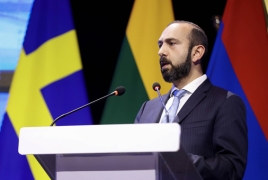FM: dialogue key for peace, neighbors lack constructive approach January 24, 2025 - 11:38 AMT PanARMENIAN.Net - Foreign Minister Ararat Mirzoyan, speaking at the "Together for Peace and Democracy" panel in Yerevan organized as part of the visit by Nordic and Baltic parliamentary delegations, discussed regional cooperation and the establishment of peace. He stressed that dialogue and collaboration with neighboring countries are essential to achieving peace while maintaining the fundamental values of democracy. Mirzoyan stated that Armenia is ready to take steps to normalize relations with Turkey and Azerbaijan. He noted that while dialogue with Turkey is currently active, tangible results are yet to be achieved. Addressing negotiations with Azerbaijan, the minister revealed that the parties have agreed on 15 out of 17 articles of a potential peace treaty and remain committed to continuing talks on unresolved issues. “Prime Minister Pashinyan has repeatedly expressed Armenia’s readiness to finalize and sign the treaty as soon as possible—if not today, then this very moment. Unfortunately, I cannot say that we see the same constructive approach and willingness from our neighbors,” Mirzoyan remarked. The minister highlighted the importance of cooperation and adherence to democratic values, emphasizing that “peace has no alternative.” In his speech, Mirzoyan also emphasized the importance of deepening ties with Nordic-Baltic countries, praising their role in promoting democratic values and addressing global risks. According to him, “Nordic-Baltic countries are exemplary in their stability of democratic institutions and protection of human rights.” “I would like to emphasize why Armenia is deeply interested in significantly expanding cooperation with Nordic-Baltic countries. The reasons are transparent, clear, and, some might say, pragmatic. Nonetheless, these reasons are as follows: I firmly believe that Nordic-Baltic countries are among those where democratic institutions are the strongest, most institutionalized, and well-protected; where human rights are the most safeguarded; and where societies firmly uphold the values of democracy and freedom. These societies understand the risks and challenges facing global democracy today. This is one dimension,” Mirzoyan added. He also reflected on Armenia’s current state, stating that the country is evolving based on democratic principles and striving for lasting peace. “First and foremost, today’s Armenia is a democracy. Secondly, it is a fledgling democracy, undoubtedly facing many challenges, mistakes, and opportunities to learn from those mistakes. Yet it is already a democracy. It is a society that has had the opportunity to demonstrate its dedication to democracy. Paradoxically, while Armenia sought to defend democracy, democracy became the very tool to protect Armenia,” said Mirzoyan. Earlier, Azerbaijani President Ilham Aliyev had claimed that Armenia must engage in dialogue with the so-called “Western Azerbaijan” community, which in Azerbaijan’s view encompasses almost all of Armenia, including Yerevan. He stated that Yerevan and Baku have yet to agree on two points of the future peace treaty: renouncing legal claims against each other in international courts and excluding the presence of third-party forces along the border. Aliyev also asserted that Armenia must make two additional concessions before signing the treaty: amending its Constitution and consenting to the dissolution of the OSCE Minsk Group. Grigoryan added that the situation around the world and particularly in the region is very difficult. The Armenian Defense Ministry has denied Azerbaijan's accusations of violating the ceasefire. Armenian Prime Minister Nikol Pashinyan took to social media to thank his Lithuanian counterpart for the contribution. President of the Armenian parliament Alen Simonyan met with the Speaker of the Azerbaijani Milli Majlis Sahiba Gafarova. Partner news |